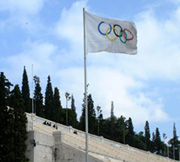 It
will be hot - hot enough that most locals will have cleared town
for cooler havens. But because athletes competing at the 2004
Olympics have no choice but to stay in the sweltering
weather, many plan to turn to science
to stay cool.
It
will be hot - hot enough that most locals will have cleared town
for cooler havens. But because athletes competing at the 2004
Olympics have no choice but to stay in the sweltering
weather, many plan to turn to science
to stay cool.
Some will wear vests filled with chilled gel, others will dunk
their hands in icewater just before competing and nearly all will
be wearing fabrics designed with hot weather in mind.
"Normally we warm up before
exercise," said Gordon Sleivert, director of sports science
and medicine at the Canadian Sport Center in Victoria, British
Columbia. "But in this case we're taking the warm out of
warm up. It's like pre-cooling."
Battling heat this summer in Athens could prove as critical a
focus as beating record times.
Meteorologists are predicting the
average high this August in Athens will be 90 degrees Fahrenheit,
with temperatures often reaching above 100 (the average temperature
in Sidney for the 2000 summer games was 64).
Humidity will also be a factor, averaging at 41 percent. Although
some events, such as the marathon, will start early (7 a.m.) to
avoid hot weather, other competitors will be pushing their limits
during peak temperatures.
In hot weather, more blood is sent to the skin for cooling so
less blood flows to your muscles. This means the heart must beat
faster to keep up the pace. By some estimates, as much as 75 percent
of the body's energy is used to regulate heat when temperatures
peak and only 25 percent to power muscles.
Drinking lots of water will help athletes maintain their cool,
but humidity remains a problem. The body's ability to cool down
is impaired by damp air since sweat drips off the skin rather
than evaporates, resulting in dehydration without the cooling.
"When the air temperature is hotter than the skin temperature,
our ability to dissipate heat from the body is impaired,"
said Sleivert. "Getting hot is a real problem because when
our brain heats up, the brain waves are more like when you're
really sleepy. Everything feels harder."
(Agencies)
